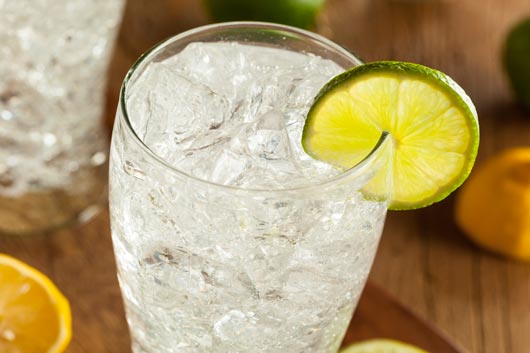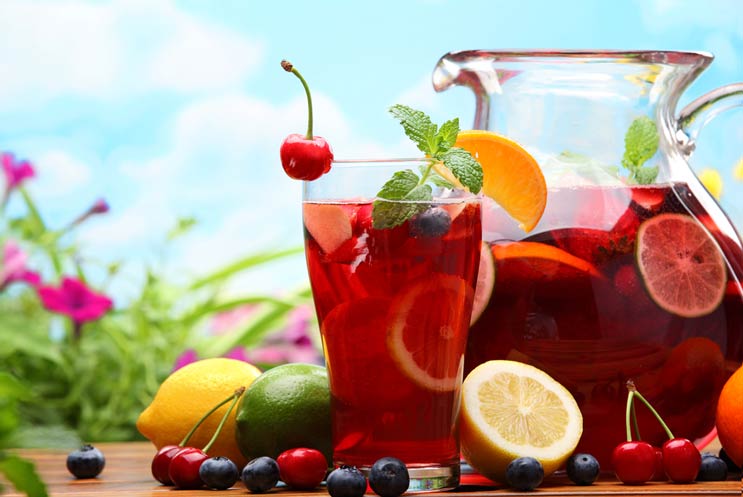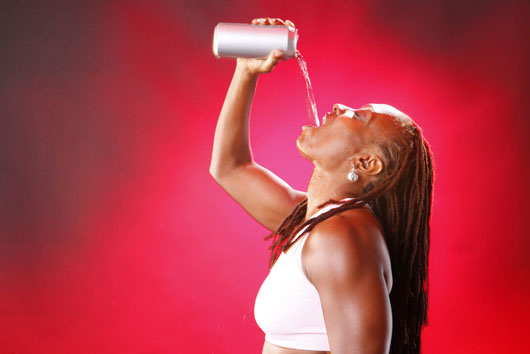
In today’s fast moving world, we’re all looking for ways to stay energized and make it through the day, and when our natural energy levels don’t seem to cut it, we need a little help. Some of us rely on caffeine, some on natural sources of energy, some on exercise and sometimes, without realizing the side effects of energy drinks, we look to them for a boost. But more and more reports are coming out telling us the countless reasons why energy drinks are really bad for our health. As Huff Post reports, according to the Substance Abuse and Mental Health Services Administration’s Dawn Report, which tracks the nation’s drug-related emergency department visits, “energy drink-related emergency department visits have skyrocketed, nearly doubling between 2007 and 2011.” That’s largely because people don’t understand how energy drinks work, what they contain, and how to regulate their intake in the same way that they manage their consumption of other, more common sources of energy, such as coffee.
Read Related: The On-Demand Reboot: How to Get Energy Right Now
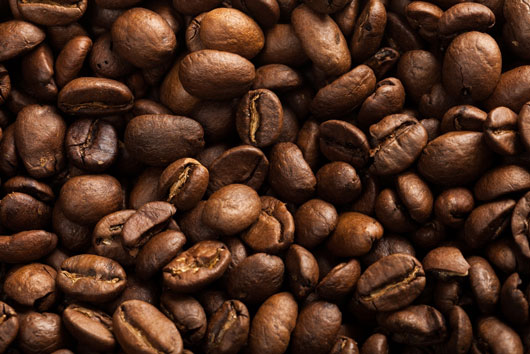
In addition, energy drinks can be misleading because the contents are largely unknown due to confusing (or inaccurate) labels and a lack of regulations over the ingredients. So you’re never totally sure what you are consuming, and yet you drink these energy drinks because they promise to make you more alert, more energized, and able to perform better mentally and physically. Like everything when it comes to your diet, your body and your health, knowledge is power. So here are 7 things you need to know about energy drinks, or more specifically 7 side effects of energy drinks to make you ditch the habit right now.
1. They contain concentrated amounts of caffeine, which can be dangerous
It should come as no shock that the number one ingredient in energy drinks is caffeine—it’s what puts energy in the energy drinks. But just how much caffeine is in there, and how much caffeine is safe for regular consumption? An 8-oz cup of coffee typically has anywhere from 95 to 200 mg of caffeine, depending on the brew, according to the Mayo Clinic. In comparison, some energy drinks can have anywhere from 80 to 500 mg of caffeine, and manufacturers are not legally required to actually disclose how much caffeine is in their drink. And beyond that, as Fox News reports, “energy drinks typically contain stimulants, such as guarana, with caffeine-like effects, along with caffeine itself,” explains Dr. Ruth Litchfield, associate professor of food science and human nutrition at Iowa State University. Bottom line: excess caffeine can cause an elevated heart rate, increased blood pressure, nervous activity and long-term risks such as heart disease. With energy drinks you don’t really know how much caffeine you are drinking, but you can be pretty certain it’s a lot more than your doctor would recommend.
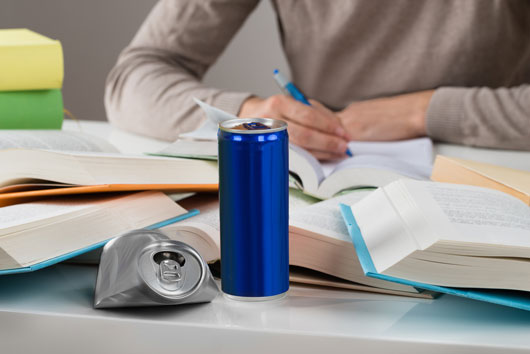
2. The exact contents are unclear
You never really know what you are drinking with your energy drink because the labels can be misleading and they aren’t consistent across brands. That is because some energy drinks are labeled as dietary supplements rather than beverages, and therefore they have different (more relaxed) guidelines for how they label their ingredients. According to the FDA, “dietary ingredients (the “active ingredients” in dietary supplements) require no FDA pre-approval to be used in a dietary supplement, and the FFDCA requires FDA to prove that a product is unsafe under the conditions of use suggested in the labeling in order to take the product off the market.” Which explains why even though these energy drinks might be unsafe, it’s hard for the FDA to regular their contents or take them off shelves. But if you ask us, it’s a pretty big red flag that you might not want to drink them.

3. The long-term health effects of these drinks is unknown
Energy drinks are relatively new to the beverage market, and because the exact ingredients and exact combination of additives is largely unknown, it’s nearly impossible to know what the long-term effects could be on your health. If dieticians are arguing that they don’t know the way that energy drinks might affect you down the road, then it seems like safe bet the effects won’t exactly beneficial.
4. They can be loaded with hidden calories and sugar
We all know that soda and juice can be packing in major calories thanks to the added sugar, and the same applies to energy drinks, according to Dr. Oz: a single “serving of an energy drink can contain as much as 14 teaspoons of sugar! That’s more than double the recommended daily dosage.” The sugar helps give you the energy boost in addition to the caffeine and other additives, but is it really worth all those extra calories and long-term weight gain?

5. If you consume too much B3 and B6 vitamins you could suffer side effects
According to Keri Peterson, MD in an article for The Dr. Oz Show, most B vitamins are healthy to consume, even in excess because you just excrete the extra vitamins in your urine. Which is good news because energy drinks often contain a LOT of B vitamins. That said, “Too much vitamin B3 (niacin) can cause a flushing of the skin, stomach upset, blurred vision or liver inflammation. Some shots have 150% more than the maximum recommended dose of 35 mg daily. Too much B6 (a dose greater than 500mg/day) can cause nerve damage, tingling and numbness in arms and legs.”

6. Energy drinks are addicting
Caffeine is a drug—in fact, it just might be America’s favorite (and most commonly consumed) drug. And like most drugs, caffeine can be addicting. According to Murray Carpenter, author of Caffeinated, How Our Daily Habit Helps, Hurts and Hooks Us, in a piece for Time, “as little as 100 milligrams of caffeine daily is enough to get an adult hooked…at this level of caffeine consumption, most people will experience some symptoms of caffeine withdrawal if they quit abruptly. Symptoms can include lethargy, no surprise, but also irritability and, especially, the classic caffeine withdrawal headache.” And yes, your energy drink has more than 100 milligrams of caffeine…way more.
7. They can dehydrate you
Because energy drinks have a ton of caffeine, they are considered a diuretic, meaning they will cause your body to lose water, so you will feel dehydrated and thirsty (and will probably want to drink more of your energy drink). It’s a vicious cycle that will ultimately cause you to consume more of these beverages than you would like, and when you consume these beverages, especially in excess, you could experience dangerous side effects and long-term issues.

